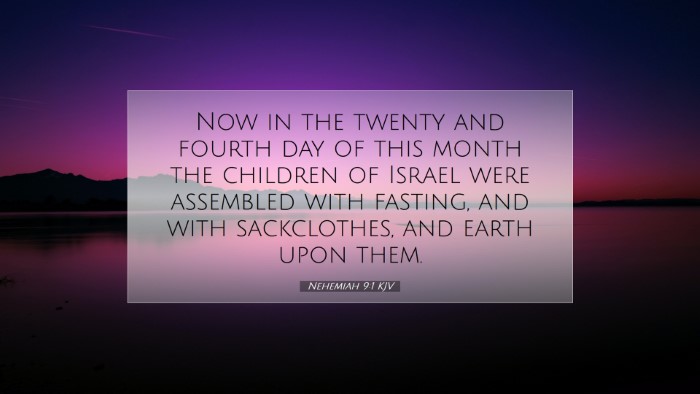Commentary on Nehemiah 9:1
Bible Verse: "Now in the twenty and fourth day of this month the children of Israel were assembled with fasting, and with sackclothes, and earth upon them."
Contextual Background
This verse is pivotal in the narrative of Nehemiah, capturing a moment of collective contrition and deep spiritual fervor among the people of Israel. The significance of the twenty-fourth day of the month follows a series of events marked by the reading of God's Law and the celebration of the Feast of Tabernacles. The people's response underscores their desire for repentance and renewal before God.
Insights from Public Domain Commentaries
Matthew Henry's Commentary
Matthew Henry highlights the profound sense of communal mourning and repentance demonstrated by the Israelites. He notes that their assembly was not merely a physical gathering but an expression of their spiritual state. Fasting, sackcloth, and the use of dust (or earth) symbolize a deep recognition of sin and a yearning for divine mercy.
- Fasting: According to Henry, fasting serves as an outward sign of inner contrition. It reflects a heart-oriented approach to seeking God, prioritizing spiritual matters over physical sustenance.
- Sackcloth: The wearing of sackcloth represents humility and sorrow. It is a traditional garment associated with grief and penitence, indicating the people's earnest desire to align with God's will.
- Earth upon them: This act of throwing dust or earth upon oneself symbolizes humility before God. It is an ancient practice indicating complete lowliness and recognition of human frailty.
Albert Barnes’ Notes on the Bible
Albert Barnes provides additional depth by examining the context of the Israelites' assembly. He suggests that this gathering signifies not only individual repentance but also corporate accountability. It indicates a communal acknowledgment of their ancestral sins that led to their exile and current predicament.
- Collective Action: Barnes emphasizes the importance of collective repentance, asserting that the acknowledgment of sin as a community is vital for divine restoration.
- Timing of the Assembly: The choice of the twenty-fourth day, immediately following the Feast of Tabernacles, is significant. It reflects a desire to return to God after a joyous celebration, underlining the idea that even in moments of joy, awareness of sin must remain.
- Spiritual Revival: Barnes connects this assembly with the idea of spiritual revival, suggesting that such penitential gatherings can lead to transformative encounters with God.
Adam Clarke's Commentary
Adam Clarke offers a thorough exploration of the implications of this verse. He posits that the actions of the Israelites are emblematic of a true penitent heart. Clarke underscores the necessity of external expressions of internal spiritual realities.
- Nature of Repentance: Clarke characterizes their actions (fasting, sackcloth, dust) as necessary components of true repentance. He emphasizes that God looks upon the heart and that these actions are expressions of a genuine desire for reconciliation.
- Public vs. Private Repentance: Clarke contrasts individual acts of contrition with this public display, suggesting the latter serves as a powerful testimony of collective faith and unity in seeking God.
- Covenantal Relationship: He reflects on the significance of maintaining a covenantal relationship with God. The people's actions are seen as steps to restore that relationship, reflecting loyalty and commitment to God's laws and commandments.
Theological Significance
The verse encapsulates several key themes relevant for pastors, students, and theologians alike:
- Repentance: The necessity of true repentance, evidenced by heartfelt actions.
- Community and Accountability: The importance of collective recognition of sin and the role of community in the church's life.
- God's Grace: The hopeful anticipation of divine mercy in response to sincere contrition.
Application for Contemporary Readers
This assembly of the Israelites stands as a model for believers today. In an era often characterized by pride and individualism, the communal nature of this repentance challenges modern readers to seek God collectively, recognizing the power of unity in addressing spiritual shortcomings.
In practical terms, church leaders might find inspiration in this passage to encourage congregational prayers of confession, communal fasting, and events aimed at spiritual renewal, fostering an environment where both individual and collective repentance can flourish.
Conclusion
Nehemiah 9:1 is more than a historical account; it invites reflection on the condition of the heart in relation to God. The Israelites' actions serve as a potent reminder that true spirituality is marked by humility, earnestness, and a desire for restoration. As current-day followers of Christ engage with this text, it calls for a renewed commitment to God characterized not only by individual devotion but by collective integrity and faithfulness.


